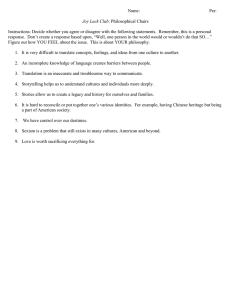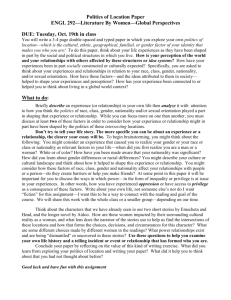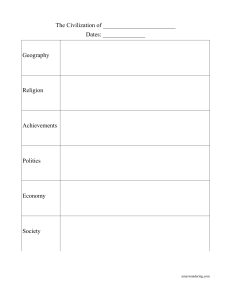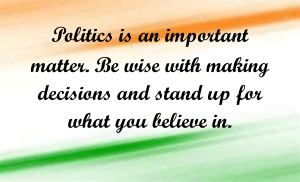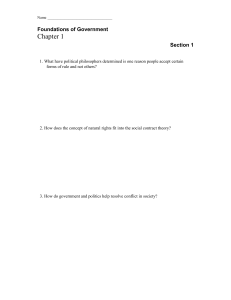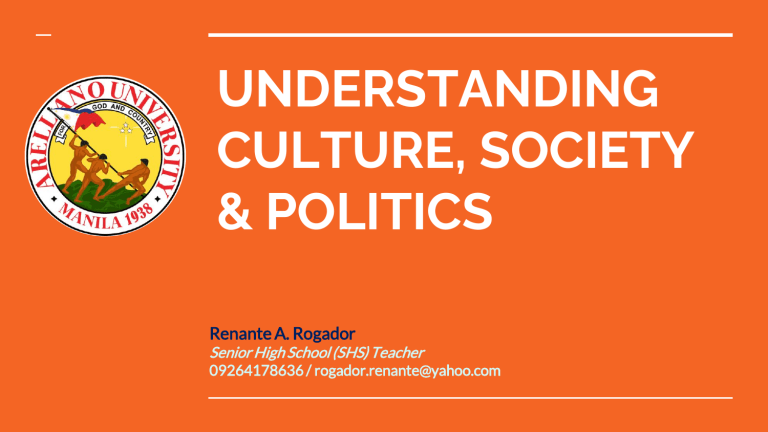
UNDERSTANDING CULTURE, SOCIETY & POLITICS Renante A. Rogador Senior High School (SHS) Teacher 09264178636 / rogador.renante@yahoo.com Course Description This course uses insights from Anthropology, Political Science and Sociology to develop students’ awareness of cultural, social and political dynamics and sensitivity to cultural diversity; provide them with an understanding of how culture, human agency, society and politics work; engage them in the examination of the country’s current human development goals. At the end of the course, students should acquire ideas about human cultures, human agency, society and politics; recognize cultural relativism and social inclusiveness to overcome prejudices; and develop social and cultural competence to guide their interactions with groups, communities, networks and institutions. THE HUMAN MOSAIC HOW ARE THEY DIFFERENT? Objectives At the end of the lesson we must be able to;. articulate observations on - human cultural variation social differences,social change and political identities. Guide Questions • • • • • What makes us different? Why we need to understand our differences? What made cultures different? What are the examples of social change? How to determine identities in politics? Human Cultural Variation It refers to the differences in social behaviors that different cultures exhibit around the world. What maybe considered good etiquette in one culture may be considered bad etiquette in another. WHAT MADE CULTURES DIFFERENT? Environment History THINK A LOT FOR A MOMENT - your parents’ cultural background - what languges and dialects you can speak - your nationality and of your great grandparents Cultural Variation Religion Ethnicity An organized system of ideas about the spiritual sphere or the supernatural. The expression of the set of cultural ideas held by a distinct ethics or indigenous group. NATION Nationality The identity that is tied to being of a part of a nation or country. A group of people who share the same history, traditions and language. Oftentimes inhabit a STATE Acquisition of Nationality Natural born citizen Jus soli Jus Sanguinis Naturalization Social Differences The differences among in the individuals on the of social characteristics and qualities. Gender Gay – men attracted emotionally, romantically and/or sexually to men. One’s sense of self as masculine or feminine regardless of external genitalia. Gender vs One’s sense of self as masculine or feminine regardless of external genitalia. Lesbian – a woman who is emotionally, romantically or sexually attracted to another woman. Sex It refers to a person’s based on their anatomy. Bisexual – a person who is attracted to two sexes or two genders but not necessarily simultaneously or equally. Transgender – are people whose psychological self differs from the sexual expectations for the physical sex they were born with. Queer/Questioning – a person who is attracted to multiple genders. Intersex – a set of medical conditions that feature congenital anomaly of the reproductive and sexual system. Social Differences Gender Gender Sex Social Change It refers to a significant in social behavior or a change in social system rather than minor changes within a small group. Type of Social Change: Evolutionary Social Change Revolutionary Social Change Evolutionary changes occur in course of a long period slowly and gradually and through evolutionary process. Such changes are not very drastic or remarkable. They proceed gradually like the process of conditioning and people learn to adjust with such changes gradually. It is the opposite of evolutionary change. When the changes in various sectors of our social system occur suddenly, drastically and sufficiently so as to differentiate it from gradual, slow change, it is called revolutionary social change. Characteristics of Social Change: Observable changes take place in the social values, customs, traditions, cultural heritage, age old beliefs, style of living, dress, attitude, superstitions stereotype, way of conducting oneself in the society, process of socialization and overall behavior of its members. Factors Influencing Social Change: Social change do not occur automatically. Certain factors do influence social change. ● Social Movement and Social Revolution ● Common Motivation ● Common Need ● Long Standing Suffering due to Suppression and Oppression ● Impact of Communication ● Education ● Technological Changes Political Identity It refers to the set of attitudes and practices that an individual adheres to in relation to political systems and actors within his or her society. Quotes for illustration purposes only Identity politics is a term that describes a political approach wherein people of a particular religion, race, social background, class or other identifying factor develop political agendas and organize based upon the interlocking systems of oppression that affect their lives and come from their various identities. Bye for now! Stay safe and healthy always!
